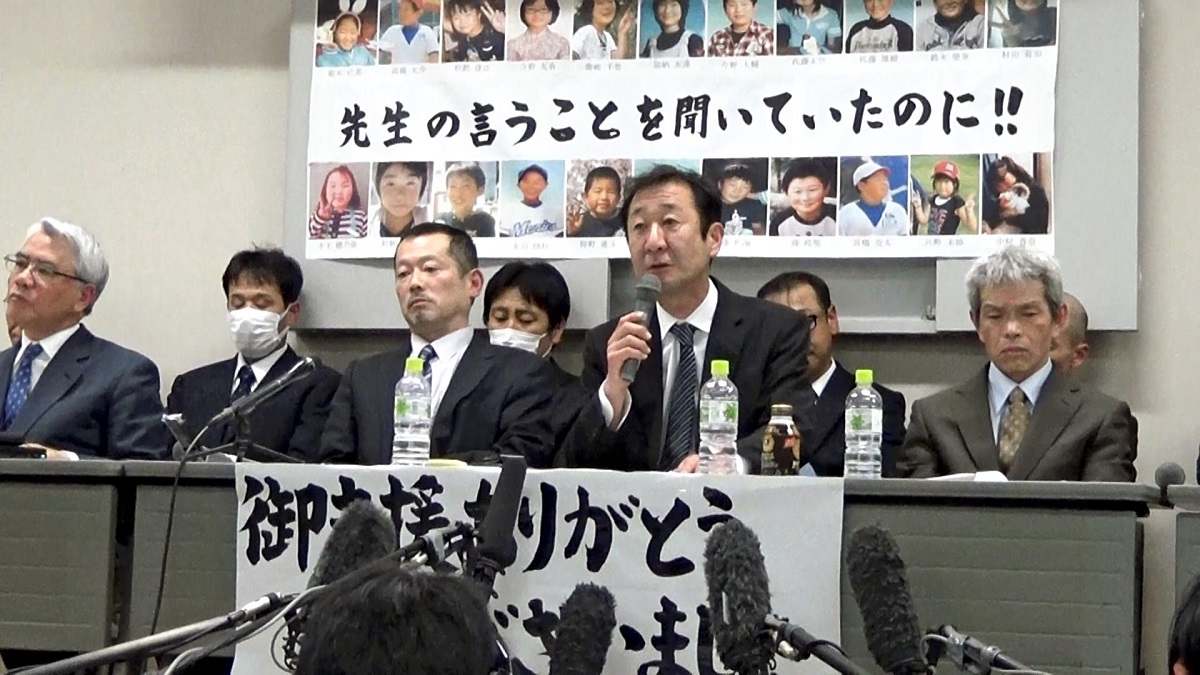Film Depicts Torment of Families who Sued over Schoolchildren Deaths in 2011 Tsunami

A scene from “Live” in which the plaintiffs attend a briefing session after a court hearing
7:00 JST, February 27, 2023
For nearly six years, the bereaved families of a number of the 74 elementary school children killed in the 2011 tsunami in Miyagi Prefecture went through a bitter lawsuit in an attempt to hold the school accountable. A documentary released on Feb. 18 logs the struggles and mental torment they went through in the process of winning the case.
The Supreme Court found Okawa Elementary School in the city of Ishinomaki systematically negligent for not ensuring the safety of the children lost in the massive tsunami triggered by the Great East Japan Earthquake in March 2011.
The decision sparked pubic debate on the best means for planning for a disaster, and in the documentary, the families make a final appeal: “How can we save lives in a natural disaster? We want people to think about it as their own problem.”
“‘Live: The people who fought the Okawa Elementary School tsunami lawsuit,” directed by Kazuhiro Terada, follows the process of the lawsuit, from the 10 contentious meetings between officials and bereaved families after the tragedy to the announcing of the verdict. There are also interviews with grieving parents.
“I carefully followed the timeline so that viewers can see it from the perspective of the parents,” Terada, 51, said,
The film also delves into the families’ emotions, such as what compelled them to file the lawsuit, and their resentment toward a judicial system that only allows plaintiffs to file a lawsuit for damages by putting “a price tag” on their lost children.
The families of 23 of the 74 children filed the lawsuit in March 2014 with the Sendai District Court, seeking compensation from the Ishinomaki city and Miyagi prefectural governments.
The court found the defendants liable in 2016, a decision that was upheld in 2018 by the Sendai High Court. The case went to the Supreme Court, which finalized the ruling in October 2019, a decision that has since had a great impact on disaster preparation measures at schools nationwide.
But the victory did not end the matter for the plaintiffs, many of whom were subjected to malevolent slander and even threats. That led lawyer Kazuhiro Yoshioka, 75, to approach Terada with the idea of making the documentary, saying, “I want to show the world how the bereaved families stood up as they were being tormented.”
As the release of the film approaches, Yoshioka said, “It records for posterity a ruling that showed the importance of ensuring safety in ordinary times and the lives of the bereaved families who won that ruling.”
One plaintiff, Hideaki Tadano, 51, who lost his oldest daughter, a third-grader at the time, said, “I hope this film will get people to ask themselves how they would have acted at that time.”
The film concludes with a scene of one plaintiff speaking at a forum saying, “A school should never become the last place in a child’s life.” It is an impassioned display of the determination shown by the families during their five-year, seven-month courtroom fight.
The 124-minute film is showing at K’s Cinema in Shinjuku Ward, Tokyo, through March 10. It will gradually be shown at other locations throughout Japan.
Related Tags
Top Articles in Society
-

Producer Behind Pop Group XG Arrested for Cocaine Possession
-

Man Infected with Measles Reportedly Dined at Restaurant in Tokyo Station
-

Man Infected with Measles May Have Come in Contact with Many People in Tokyo, Went to Store, Restaurant Around When Symptoms Emerged
-

Woman with Measles Visited Hospital in Tokyo Multiple Times Before Being Diagnosed with Disease
-

Australian Woman Dies After Mishap on Ski Lift in Nagano Prefecture
JN ACCESS RANKING
-

Producer Behind Pop Group XG Arrested for Cocaine Possession
-

Japan PM Takaichi’s Cabinet Resigns en Masse
-

Man Infected with Measles Reportedly Dined at Restaurant in Tokyo Station
-

Israeli Ambassador to Japan Speaks about Japan’s Role in the Reconstruction of Gaza
-

Videos Plagiarized, Reposted with False Subtitles Claiming ‘Ryukyu Belongs to China’; Anti-China False Information Also Posted in Japan























